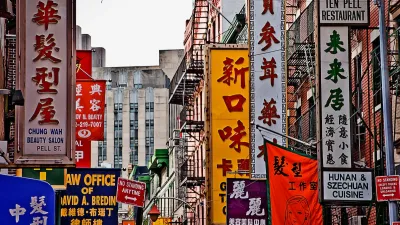Facing gentrification and skyrocketing property prices, business owners in New York's Chinatown are thinking about forming a Business Improvement District. Many say the plan would hurt small businesses.
"Many Chinese-Americans thought that through decades work and sacrifice, the poverty and racism that many had historically experienced would diminish. However, many residents now feel that the trauma of gentrification and rising rents, the loss of Chinatown's manufacturing and garment sector to outsourcing and continuing racism threaten to push the quality of life for Chinatown residents back to the 1870s when the community began."
"Wong's Restaurant Alliance is but one of many groups in a new coalition called the Coalition to Protect Chinatown and the Lower East Side. Gentrification and racism are long-term issues facing Chinatown residents, but recent attempts by the Chinatown Partnership and the Rebuild Chinatown Initiative to launch a business improvement district, or BID, have triggered a wave of activism and debate in the community."
"Business improvement districts are formed by property and business owners to improve commercial districts. They work by assessing all property owners in the district an additional 3 percent to 5 percent property tax, and then use these funds for privatized sanitation services - such as street cleaning and graffiti removal - security and other activities that owners would like to bring to the neighborhood, such as cultural programming."
"In order to win approval, more than 50 percent of the district's property owners must back the BID, but usually much more support is needed than that. Commercial landlords generally pass on the assessment to their commercial tenants, while residential co-ops usually have only a nominal fee, very often $1."
"The Chinatown Partnership, a major advocate for a local BID, currently runs programs like a Taste of Chinatown and a clean-streets initiative, and it believes that without the resources from BID assessments, these beneficial programs would be forced to close."
"But the proposal has angered residents such as Lee and Wong, who believe the property-tax increase would push small business owners - barely hanging on already - over the edge, and out of Chinatown."
FULL STORY: BID battle brews amid a changing Chinatown

Maui's Vacation Rental Debate Turns Ugly
Verbal attacks, misinformation campaigns and fistfights plague a high-stakes debate to convert thousands of vacation rentals into long-term housing.

Planetizen Federal Action Tracker
A weekly monitor of how Trump’s orders and actions are impacting planners and planning in America.

San Francisco Suspends Traffic Calming Amidst Record Deaths
Citing “a challenging fiscal landscape,” the city will cease the program on the heels of 42 traffic deaths, including 24 pedestrians.

Defunct Pittsburgh Power Plant to Become Residential Tower
A decommissioned steam heat plant will be redeveloped into almost 100 affordable housing units.

Trump Prompts Restructuring of Transportation Research Board in “Unprecedented Overreach”
The TRB has eliminated more than half of its committees including those focused on climate, equity, and cities.

Amtrak Rolls Out New Orleans to Alabama “Mardi Gras” Train
The new service will operate morning and evening departures between Mobile and New Orleans.
Urban Design for Planners 1: Software Tools
This six-course series explores essential urban design concepts using open source software and equips planners with the tools they need to participate fully in the urban design process.
Planning for Universal Design
Learn the tools for implementing Universal Design in planning regulations.
Heyer Gruel & Associates PA
JM Goldson LLC
Custer County Colorado
City of Camden Redevelopment Agency
City of Astoria
Transportation Research & Education Center (TREC) at Portland State University
Jefferson Parish Government
Camden Redevelopment Agency
City of Claremont




























